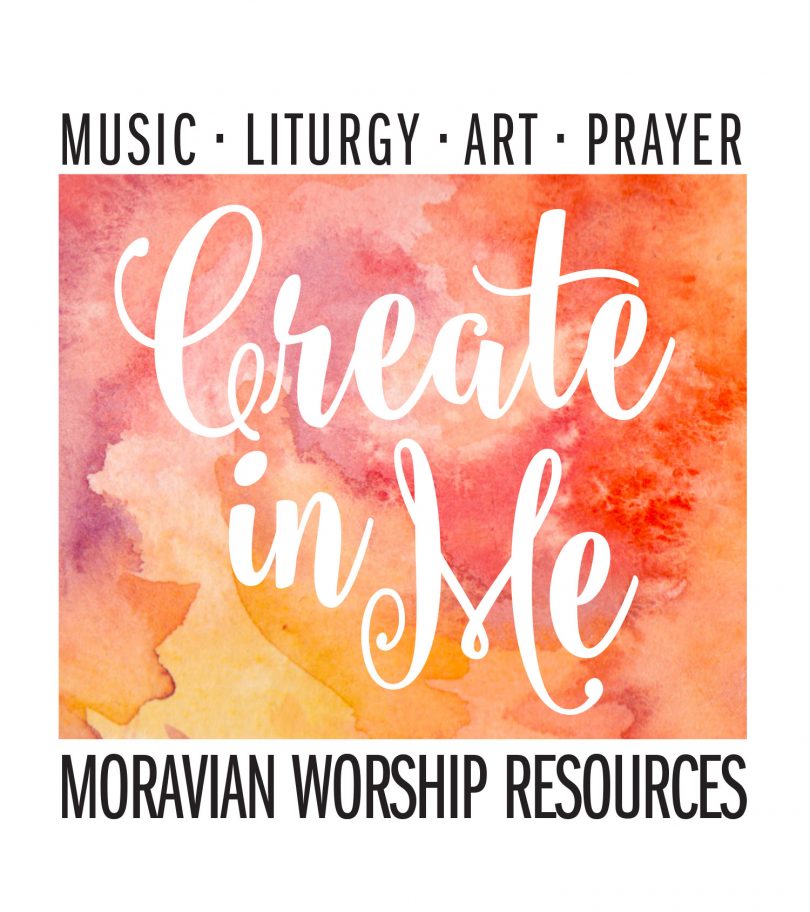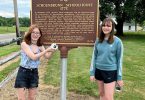Hymn composition is in the very DNA of Moravians. We have always been a people who sing, express our faith musically and enjoy creating our songs. One of the great joys of Moravian hymnody is that creativity and faith often join forces to provide music of assurance for the moment. We have always had a hymn for just about anything, be it in celebration, sorrow or for specific occasions. Moravians are often (justly) accused of “singing our faith” because we always have a hymn or two to illustrate scripture or theology (Just look at the Daily Texts!). Our composers, then, are very important in our worship and daily life. Yet our hymn creators aren’t always whom you would expect!
June Edwards, a member at Trinity Moravian in Winston-Salem, started writing hymns about 12 years ago, when she shared some of her poetry with Pastor Polly Applefield. She insisted that June’s verses were hymns. June had no background in music, other than a love of singing, and no formal training. (In fact, she joined the choir at Trinity Moravian because she wanted to learn to read music!) As a result of this encouragement, the poem became the hymn “The Woman at the Well.”
Soon, another poem became a hymn and was sung in worship. More followed. Those early attempts led her to the back of the Moravian Book of Worship: the Metrical Index of Tunes. Each chorale/hymn is broken down into syllables. She discovered that if she wrote a song with 4 syllables in 4 lines, she could find a corresponding tune with 4.4.4.4 meter. She would turn to one of those hymns and sing her words to that tune. If they worked, great! If not, there were plenty more from which to choose. She typically uses an existing tune, but she has also written original music.
June’s process is one of faith. She says, “I begin to write usually when something is bothering me, or I have strong feelings. Often it is something that is troubling me enough that I’m praying about it, so I’m having this conversation with God and the resulting hymn is the answer to my praying.”
When she goes to bed, those ideas often begin to percolate. In those moments with nothing distracting her, she begins to work out what the hymn will be about. She takes notes, often starting with a couplet, or a phrase that rhymes.
Shortly after the COVID-19 shut down, she was pondering all the events on her full calendar that now meant nothing. Images came to mind, and the following hymn was born:
“Christian Hands in Love are Washing”
(tune: Cassel 167 A)
Christian hands in love are washing,
we’re adorned with mask and glove.
Social distance is required,
to proclaim the Savior’s love.
Learning Skype and Zoom and Morse Code,
sharing blogs and twittered memes,
help us all to feel connected
while we COVID quarantine.
Separated, yet united,
by faith in our risen Lord,
may we learn God’s grace and bounty
isn’t ours to take and hoard.
Whether it be food or favor,
medicine or new vaccine,
may we share what you provide us
to survive COVID-19.
June’s hymns are both light-hearted and serious in nature, depending upon the occasion and her inspiration. She said, “There are so many hymns that are for the ages, like ‘Sing Hallelujah, Praise the Lord’ and ‘Jesus Still Lead On.’ But there is also a need for hymns written for the moment. They remind us that God is present both in eternity and in the trauma and drama of the present.”
Sometimes the subjects (like Coronavirus) choose her, and other times she says things evolve because God won’t let her let the subject go. Often she is asked to compose hymns for special services. Recently Pastor John Jackman of Trinity asked her for a hymn about three parables. “He actually gave me a week that time,” she laughs. Sometimes she has a significant line running around in her head, and she waits until she feels led to use it. Twelve years ago, Pastor Polly gave her a book entitled Every Bush is Burning by Brandon Clements. June knew she was going to write a hymn from that line, but it took 12 years for her to connect with what she wanted to say. She writes for specific events, as when she felt led to compose a hymn around the 2008 election and “King of Kings, You Reign Forever” was born. [see right]
Her goals in hymn writing are to try and connect the message biblically, as it is presented in scripture. “I want people who are singing the hymn to find themselves in the story and then I want to challenge them.” A good hymn, she says, “challenges us not just with what we would do if we were there, but what we will do now.” She strives to connect faith to present circumstances. She wants to give a voice to feelings that have a broad reach. She is keenly aware and deliberate in her writing, allowing God to speak through her, humbled in that responsibility.
June’s theology shines through her songs. They have the recurrent themes of God knowing and calling our name; they emphasize the grace and love of Jesus; they challenge the singer to act kindly with love and generosity. She came to faith later in life and not through traditional means. “When I first read the Gospels, I took them seriously – to give your coat, to love your neighbor.” June not only writes about faith, she lives it.
Since her first hymn was sung, June has composed for several Women’s Conferences, Childrens’ Festivals, The Unity Women’s Desk and other special events. Her compositions have been sung in Moravian congregations all over North America, in South Africa, Denmark and in the United Church of Canada. Her creativity extends to many areas, but her ability to compose for the moment; this is one of her great, Spirit-filled gifts.
Her advice to those who want to write hymns is to “do it!” She suggests a good thesaurus and rhyming dictionary, along with the MBW. These are essential tools. But, she says, “Find someone, a pastor, worship leader, choir director, who is willing to let your hymns be heard! If I had not had Pastor John saying, ‘Yes! We’ll do it,’ I’m not sure if I would have found my voice.”
Her first (and favorite) hymn “The Woman at the Well” applies to her as well. “I identify with her. She wasn’t expecting to find a Savior because she wasn’t one of the ‘chosen people.’ I feel much the same: I was surprised by the Savior when I went to the well.” We pray that she will continue going to visit, and that her cup will always overflow.
The Woman at the Well
(Tune: Eisenach 90 A)
I was not of the Chosen Tribe,
not Pharisee or Priest or Scribe;
it was not from your flock I strayed,
but from the wild, lost and afraid.
But at the well you knew my name,
and I will never be the same.
My people came from foreign shore,
we did not know your law and lore.
We saw your bounty and your grace;
but knew a different name and face.
But at the well you knew my name,
and I will never be the same.
The life I’d lived had brought me shame’
the men I chose left me to blame.
I came to drink at highest sun
so others would not taunt and shun.
But at the well you knew my name,
and I will never be the same.
You spoke to me, and bid me serve
a God whose grace I don’t deserve.
You knew my choices at their worst,
told me to drink and never thirst.
For at the well you knew my name,
and I will never be the same.
King of Kings, You Reign Forever
(tune: Jesus Calls Us)
King of kings, you reign forever,
through our quarrels you are sure.
Through the storms that would o’ertake us,
you still reign forevermore!
Lord we see each new disaster,
leaders fail, our heroes fall.
Yet through fear and through the turmoil,
you’re still reigning over all.
You rule worlds that know no borders,
you, by laws, can’t be contained.
Even through our worst intentions,
you are King and you remain.
Lord watch o’er this year’s election,
may we true results obtain.
Heal the strife and the division,
over all you still remain.
King of kings, you reign forever.
Work your people to restore.
You have raised us as your children,
you are King forevermore!
Thanks to Joyce Carter from Winston-Salem, N.C., for this article. Hymn lyrics throughout are © June Edwards. See separate story for music and lyrics for June’s hymn, “There’s A Light.”







